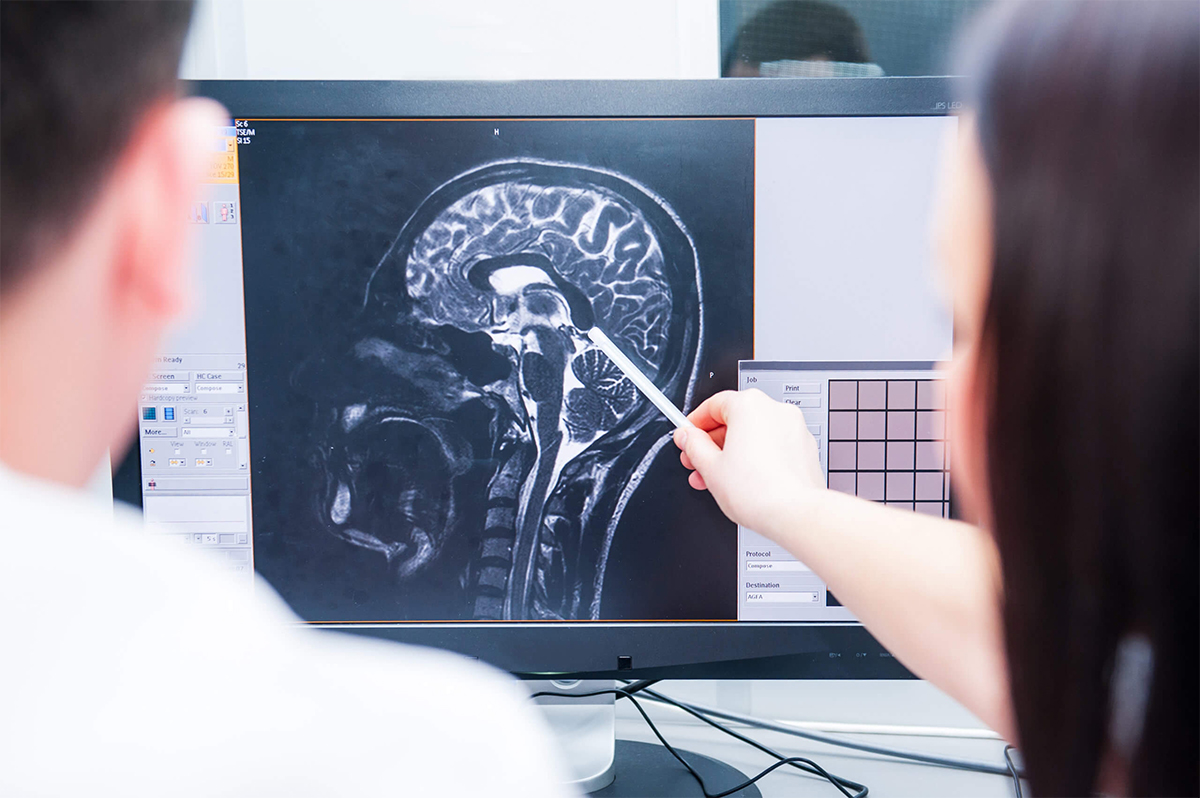What is Aphasia?
Aphasia is a language disorder that affects a person’s ability to communicate and understand language. It can occur as a result of various factors, such as:
- Brain tumors
- Neurodegenerative diseases
- Stroke
- Traumatic brain injury
People with aphasia may struggle with speaking, listening, reading, and writing, which can significantly impact their daily lives and relationships.
There are different types of aphasia, including expressive aphasia, receptive aphasia, and anomic aphasia, each with its own characteristics and symptoms.
While aphasia can be a challenging condition to live with, there are treatment options available, such as language therapy and speech therapy, which can help individuals regain and improve their language skills. [1]
How does Accident-related Aphasia Occur?

Accident-related aphasia can occur as a result of brain damage. One common cause is traumatic brain injury (TBI), which can happen due to accidents such as car accidents, slip & fall accidents, construction accidents, etc.
In some cases, gunshot wounds to the head can result in brain damage and, subsequently, aphasia. The injury can impact the specific regions of the brain responsible for language, leading to difficulties in communication.
Accidents and injuries can have a profound impact on a person’s ability to communicate. Understanding how accident-related aphasia occurs is crucial for providing appropriate treatment and support to individuals affected by these conditions.
By identifying the causes of brain damage, healthcare professionals can develop targeted intervention strategies to improve language abilities and quality of life for those with accident-related aphasia.

Types of Aphasia
Here are some of the most common types of aphasia:
- Anomic Aphasia: Anomic aphasia is related to difficulty finding the right words for what you want to say. People with this type of aphasia may struggle to recall names or other words, even though they know what they mean.
- Expressive Aphasia: This type of aphasia affects a person’s ability to express themselves. People with expressive aphasia may struggle to speak properly, and their speech may be slow and halting.
- Global Aphasia: Global aphasia is the most severe form of aphasia. It affects all aspects of language, including speaking, understanding, reading, and writing. People with global aphasia may not be able to communicate at all.
- Receptive Aphasia: Receptive aphasia affects a person’s ability to understand language. People with this condition may have difficulty comprehending what is said to them, even if they can hear it properly.
Traumatic Brain Injury (TBI)
Traumatic Brain Injury (TBI) is a common result of accidents, including vehicle collisions. It is characterized by damage to the brain caused by external forces, such as a blow or jolt to the head. [2]
TBI can have a significant impact on language skills, leading to a communication disorder known as aphasia.
Aphasia is a language disorder that can occur as a result of brain injuries, including TBI, affecting the ability to speak, understand, read, and write.
The severity and type of aphasia can vary depending on the location and extent of the brain damage. When the left hemisphere of the brain is affected, individuals may be at a higher risk of developing anomic aphasia, which is characterized by word-finding difficulties.
The effects of TBI-related aphasia can be long-lasting and may result in permanent damage to language function. Individuals may struggle with completing sentences, finding the right words, or understanding others.
The process of communication can become slow and effortful. Magnetic resonance imaging (MRI) or other imaging techniques may be used to assess the extent of brain damage and determine the appropriate treatment options.
Treatment for aphasia caused by TBI often involves language therapy and speech therapy. These therapies aim to improve language abilities and provide strategies for compensating for communication difficulties.
It is important to note that recovery can be a slow process, and some individuals may continue to experience challenges with language and communication despite treatment.

Effects of Accident-related Aphasia
Understanding the impact of accident-related aphasia can help individuals and their loved ones navigate the challenges it presents and seek appropriate support and intervention.
Communication Ability and Skills Impacted
Aphasia affects the person’s language abilities, including their understanding and expression of language, as well as their overall communication skills.
Accident victims with aphasia may find it challenging to comprehend spoken and written language, making it difficult for them to follow conversations or understand instructions.
They may struggle with finding words, forming complete sentences, and organizing their thoughts. Expressive aphasia, for example, hampers their ability to express their ideas and thoughts through speech or writing.
Aphasia can severely impact an individual’s communication skills. They may experience difficulties in maintaining social interactions, leading to feelings of:
- Frustration
- Isolation
- Loss of self-esteem
Everyday tasks, such as making phone calls, writing emails, or reading, can become overwhelming.
Treatment for aphasia may include speech therapy. This treatment can help improve:
- Language function
- Enhance communication skills
- Promote understanding of language
Rehabilitation techniques may include language exercises, cognitive training, and communication strategies that assist individuals with aphasia in regaining their communication abilities and skills.

Incomplete Sentences and Phrases Used by People with Aphasia
People with aphasia, particularly those with mixed non-fluent aphasia or semantic primary progressive aphasia, often struggle with incomplete sentences and phrases as a result of their language disorder.
These incomplete sentences and phrases can manifest in various ways and significantly impact their communication abilities.
Individuals with mixed non-fluent aphasia may have difficulty comprehending and producing grammatically complete sentences.
They might only be able to express simple phrases or fragments, such as “want go” instead of “I want to go.” Similarly, their understanding of speech may be impaired, making it challenging for them to grasp the full meaning of a sentence or conversation.
In the case of those with semantic primary progressive aphasia, they may struggle with naming objects and understanding word meanings.
They might use inadequate or incorrect words to describe objects or concepts, resulting in incomplete or confusing sentences. For example, they may refer to a “thingamajig” instead of the specific object they are referring to, such as a pen.
Furthermore, individuals with aphasia may face limitations in reading and writing beyond an elementary level. They may have difficulty comprehending complex written materials and struggle with expressing their thoughts coherently in writing.
Incomplete sentences and phrases may appear in their written communication, further hampering their ability to convey their intended message effectively.
If you or a loved one are suffering from aphasia and need legal representation for a personal injury case, contact Lein Law’s personal injury lawyers today to ensure your rights are protected and receive the compensation you deserve.
Sources:
[1] Bonilha, L., Gleichgerrcht, E., Nesland, T., Rorden, C., & Fridriksson, J. (2015, July 6). Success of Anomia Treatment in Aphasia Is Associated With Preserved Architecture of Global and Left Temporal Lobe Structural Networks. Neurorehabilitation and Neural Repair; SAGE Publishing. https://doi.org/10.1177/1545968315593808
[2] Traumatic brain injury – Symptoms & causes – Mayo Clinic. (2021, February 4). Mayo Clinic. https://www.mayoclinic.org/diseases-conditions/traumatic-brain-injury/symptoms-causes/syc-20378557


